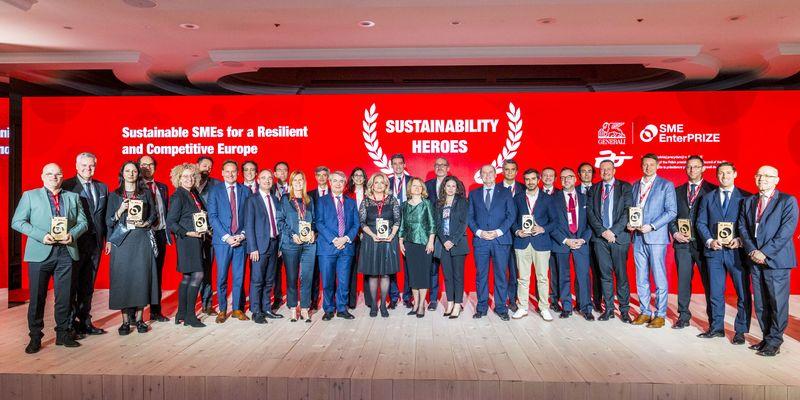The international Generali also awarded a Hungarian SME: the company that developed the composting robot is a pioneer in urban circular farming
The sustainable transition of European SMEs could be more effectively supported by simplifying the regulatory framework, introducing tax incentives and introducing targeted financial solutions, according to a White Paper prepared by the Generali Group and SDA Bocconi, presented for the fourth time this year. The Generali SME EnterPRIZE initiative aims to support the adoption of sustainability practices among small and medium-sized enterprises, and in addition to assessing current trends and challenges, it also annually recognizes 10 “Sustainability Heroes” companies that set an example in the green transition. This year’s EnterPRIZE event was held under the patronage of the Polish Presidency of the European Council and was attended by, among others, Martin Hojsík, Vice-President of the European Parliament.

Philippe Donnet, CEO of the Generali Group, said:
“Amid global financial uncertainties, geopolitical tensions and rapid technological change, small and medium-sized enterprises (SMEs) continue to face significant challenges. At Generali, we are convinced that a sustainable transition can bring key benefits to SMEs and we remain committed to accompanying and supporting them on this journey. Furthermore, one of the main objectives of EnterPRIZE has always been to foster dialogue with European policymakers and financial professionals, with a view to ultimately creating a regulatory framework that truly enables businesses to adopt sustainable practices. This also aligns well with the priorities of the European Commission, and I am confident that together we will move forward towards a more competitive, resilient and sustainable Europe.”
There may be a huge gap between SMEs and SMEs: more targeted incentives are needed
The 2025 edition of the White Paper was prepared by surveying 1,260 European small and medium-sized enterprises and shows that, despite significant environmental, economic and policy challenges, companies that have embarked on the green transition remain committed to implementing sustainability measures. In addition, there are tangible arguments: 75% of them reported improved employee and customer satisfaction, 67% reported an increasing competitive advantage, while the business value of sustainability is also tangible. 63% of companies have obtained more favorable credit conditions (an 8% increase compared to 2023) and insurance conditions. However, the book also draws attention to the fact that in many cases there is a huge sustainability gap between SMEs and SMEs, and smaller companies are typically lagging behind in the green transition. There is therefore an urgent need to develop targeted and differentiated support mechanisms that effectively address the diverse needs of the European SME ecosystem.
Related news
AI in small businesses: lack of guidance slows down progress
🎧 Hallgasd a cikket: Lejátszás Szünet Folytatás Leállítás Nyelv: Auto…
Read more >Related news
PwC Global CEO Survey: CEO confidence at a five-year low
🎧 Hallgasd a cikket: Lejátszás Szünet Folytatás Leállítás Nyelv: Auto…
Read more >The Year of the Horse – Culinary trends in 2026
🎧 Hallgasd a cikket: Lejátszás Szünet Folytatás Leállítás Nyelv: Auto…
Read more >









